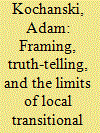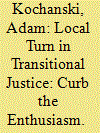| Srl | Item |
| 1 |
ID:
180349


|
|
|
|
|
| Summary/Abstract |
Transitional justice (TJ) is undergoing a legitimacy crisis. While recent critical TJ scholarship has touted the transformative potential of locally rooted mechanisms as a possible means to emancipate TJ, this burgeoning literature rests on shaky assumptions about the purported benefits of local TJ and provides inadequate attention to local-national power dynamics. By taking these factors into consideration, this article contends that local TJ efforts can be used to deflect justice in manners that paradoxically allow ruling parties to avoid human rights accountability and to conceal the truth about wartime violations. It further argues that the principal method by which justice is subverted is not through overt manipulation by abusive governments, but rather, through subtle and indirect ‘distortional framing’ practices, which ruling parties use to set discursive limits around discussions of conflict-related events and to obfuscate their own serious crimes. After developing this argument theoretically, the case study of Cambodia is considered in detail to reveal and to trace the processes by which distortional framing has been used as a technique to deflect justice.
|
|
|
|
|
|
|
|
|
|
|
|
|
|
|
|
| 2 |
ID:
171766


|
|
|
|
|
| Summary/Abstract |
Recent years have witnessed a “local turn” in the study and practice of peacebuilding, international development, and transitional justice (TJ) that has emphasized the importance of local-level knowledge and initiatives. The proliferation of customary, locally rooted TJ processes in states that have experienced violence is a part of this trend. While most studies have taken a sanguine view of the cultural and practical advantages of local TJ, this article contends that existing scholarship neglects the influence of asymmetric power relations and political motivations that have the potential to distort these processes. This article invites a more nuanced discussion of local TJ, rooted in systematic and comparative scholarship of how these processes actually operate on the ground, in order to improve understandings of their promise and perils.
|
|
|
|
|
|
|
|
|
|
|
|
|
|
|
|